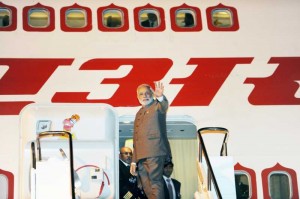 Indian Prime Minister Narendra Modi will be welcome whenever he chooses to visit Pakistan, said that country’s envoy here Friday.
Indian Prime Minister Narendra Modi will be welcome whenever he chooses to visit Pakistan, said that country’s envoy here Friday.
Pakistan High Commissioner Abdul Basit said a visit to Pakistan by Modi “would be welcome whenever he comes”.
But Basit noted that such high-level visits “don’t happen without adequate preparation”.
“It is too early to say anything” about such a visit, he said at an event at the Press Club of India.
Basit said the meeting between Modi and Pakistan Prime Minister Nawaz Sharif during Modi’s May 26 swearing-in ceremony and the bilateral talks a day later here “was a good beginning”.
He said Sharif has articulated the agenda of “development for security and security for development” and “we are very glad that the new Indian government is also committed to it…There is compatibility of agendas”.
While stressing that it was time for Pakistan and India to “dispense with past stereotypes” and move forward in their bilateral relationship, Basit said that “all roots of the problems go back to Jammu and Kashmir”.
“The genesis of all disputes find origin in J and K… we need to resolve all the issues. We have new challenges to face like terrorism,” said the envoy and stressed that both sides need to bring stability to the region through more engagement.
He said that Pakistan is keen to build itself as a bridge between South Asia and the Economic Cooperation Organisation, a bloc of 10 South-Central Asian countries which was founded by Turkey, Pakistan and Iran in 1985.
He said Pakistan is “destined to become a regional economic power” and is keen to boost regional connectivity.
Pushing for more bilateral connectivity, Basit said it was shameful that though both countries share a long border they hardly have any air connectivity. He also said that both sides were examining a proposal for roaming facility on the SIMs of mobile phones of citizens while in each other’s country.
On international issues India and Pakistan have convergences, said Basit. Both countries could work together on issues like climate change, human rights, peace keeping, he added.
“I am confident (we can work together)…the warmth we feel in the environment of India, it is unparalleled,” said the high commissioner.
To a question on ceasefire violations, the envoy said there was a different story being told on each side about who was responsible, and underlined that both countries need to “shed stereotypes and move on”.
He also expressed happiness on the TV channel called Zindagi, launched June 23 in India, that shows Pakistani programmes.
“People will see Pakistan in a different prism,” he said.
On Operation Zarb-e-Azb, an anti-terror offensive launched by the Pakistan military in the tribal areas, Basit said it was proceeding “very, very well” and his government is confident of “cleansing the area of militants and terrorists”.
On the sense of insecurity being felt by Hindus in Karachi with temples being demolished, Basit said the government has launched an operation to cleanse it of anti-social elements.